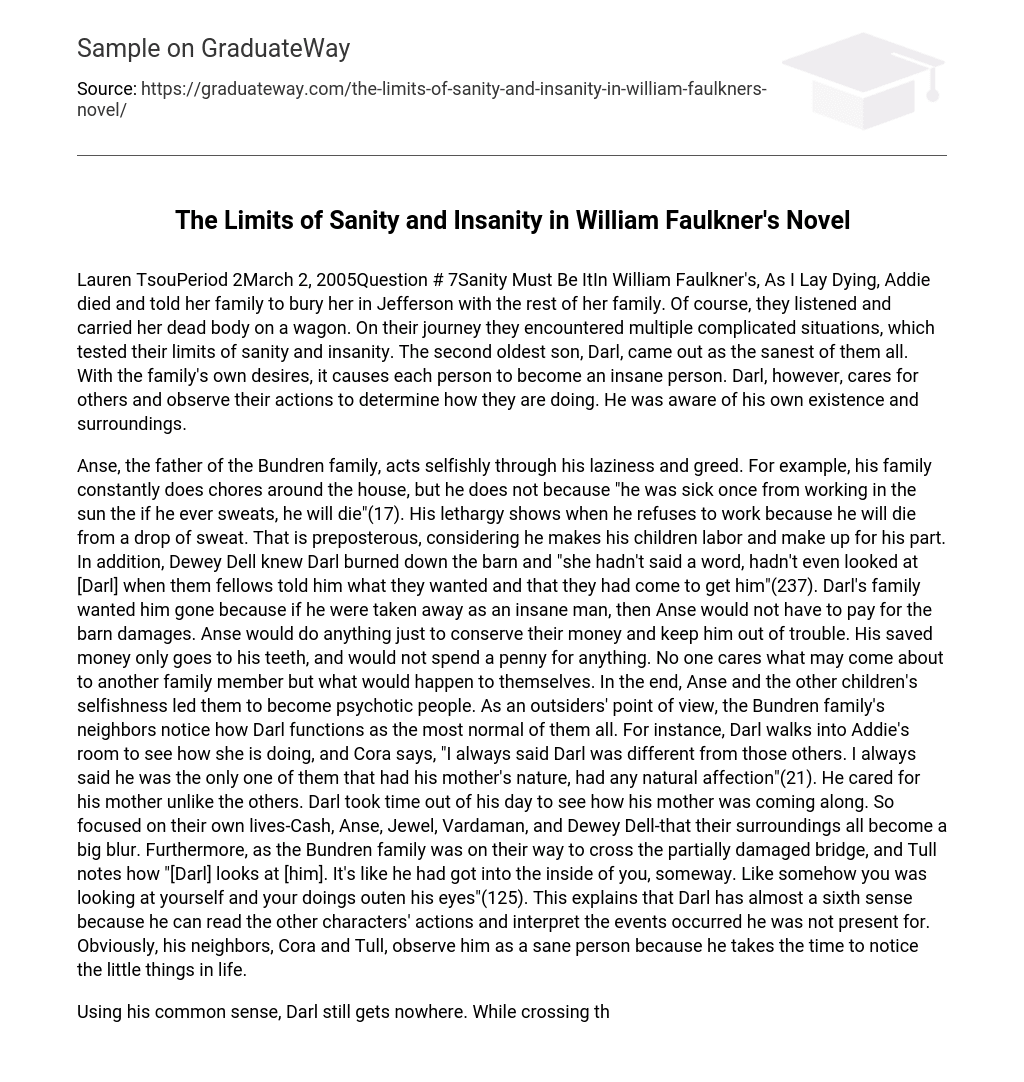In William Faulkner’s, As I Lay Dying, Addie passed away and instructed her family to lay her to rest in Jefferson alongside her relatives. The family obediently transported her lifeless body by wagon, encountering numerous complex circumstances that pushed their boundaries of sanity. Out of all the siblings, Darl emerged as the most mentally stable. Due to the family’s individual desires, each member succumbed to a state of insanity. Conversely, Darl showed genuine concern for others and carefully assessed their behavior to gauge their well-being. He possessed a keen awareness of his own existence and the world around him.
The text highlights Anse’s selfishness through his laziness and greed. Despite his family constantly doing chores, Anse refuses to work due to his fear of sweating and potentially dying. This is absurd, considering he makes his children compensate for his lack of effort. Furthermore, Dewey Dell remains silent and avoids eye contact with Darl when informed that he burned down the barn.
Darl’s family wished to remove him from their midst so that Anse wouldn’t have to bear the cost of repairing the barn. Anse’s sole concern was preserving their finances and avoiding trouble. Any money he saved was solely for his dental expenses, with not a single penny spent on anything else. The welfare of their fellow family members held no importance, only their own wellbeing. Ultimately, the self-serving nature of Anse and the other children led them down a path of madness.
The observation made by the Bundren family’s neighbors is that Darl appears to be the most normal among them. This is evident in Darl’s actions as he enters Addie’s room to check on her well-being, which prompts Cora to remark, “I always believed that Darl was different from the others. I always believed that he was the only one who inherited his mother’s nature and possessed any genuine affection” (21). Darl’s concern for his mother sets him apart from his siblings. While Cash, Anse, Jewel, Vardaman, and Dewey Dell are preoccupied with their own lives, their surroundings become a blur to them. Additionally, during the Bundren family’s journey across the partially damaged bridge, Tull observes how Darl “looks at him” in a way that makes him feel like he is being seen through Darl’s eyes, as if Darl is viewing his own actions and behavior (125).
This passage illustrates Darl’s heightened perception, as he is able to discern the behaviors of other characters and make sense of events that he did not witness. Cora and Tull, his neighbors, recognize his sanity as he pays careful attention to the small details of life.
Despite using his common sense, Darl’s efforts prove fruitless. While they are crossing the bridge, a log approaches and strikes the wagon. Darl observes Cash positioned “leaning back against Addie and his tools, and beyond them Jewel holding the horse upreared.” Subsequently, he swiftly jumps “from the wagon on the downstream side” (149). These two individuals, with their deranged minds, would rather cling to their dearest possessions than value their own lives. The influence of personalities is evident as Anse’s traits seem to have rubbed off on his children. At a later point, in a bid to destroy Addie and her coffin, he sets fire to Armstid’s barn, but Jewel ultimately manages to save it. Meanwhile, Darl is found sobbing “under the apple tree with her, lying on her” (225).
Darl believes his mother is haunting him as she keeps returning despite his efforts to get rid of her. He attempted to end the journey to Jefferson because he knew they were not going for Addie, but for their own selfish reasons. Completely defeated, Darl was sent to an asylum. While on the train, he laughed, and as he passed, the heads turned like those of owls: “down the long car laughing, the heads turning like the heads of owls when he passed” (253). His laughter wasn’t due to insanity; instead, he laughed because he understood that he was the only sane person in his family and now he is gone.
Despite being sent away, Darl remained the most sensible. He displayed empathy for others and their dilemmas, observing them attentively. He also paid attention to his environment and had a strong sense of self-awareness. It seemed that his family did not realize they were living solely for material possessions—Cash with his tools and Jewel with his horse. The idea of sacrificing one’s life for these items was not even considered. In essence, this establishes Darl as the epitome of sanity.





